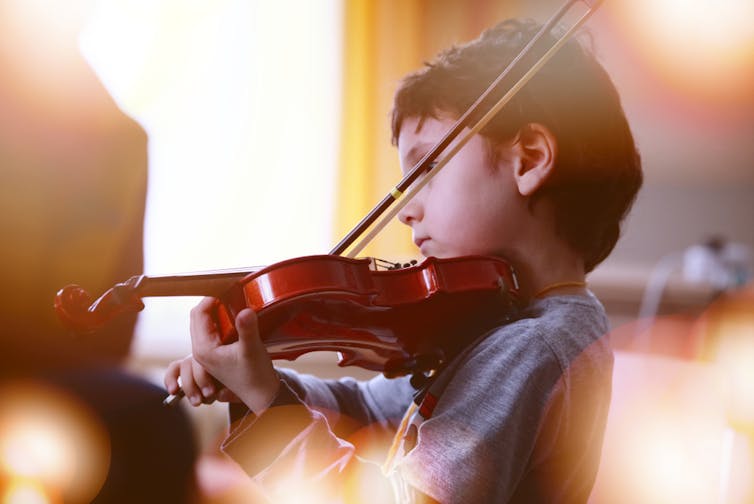[ad_1]
It’s 4pm on a Thursday, and your youngster is on the sofa with the iPad. It’s good to depart for the weekly music lesson in half an hour. You possibly can see mud has gathered on the piano (or the flute or the saxophone), and one other week has handed with solely rare and erratic makes an attempt at observe.
Your youngster claims to need classes, however doesn’t appear to place within the effort. The prospect of paying one other time period’s tuition is the final straw. You order your youngster off the sofa and direct them to their instrument. What must be a rewarding exercise on your youngster has grow to be a bone of competition between you. And also you dislike the nagging mum or dad you’ve grow to be.
What dad and mom say and do issues
Analysis confirms the advantages of studying a musical instrument. It develops a life-long ability and gives youngsters a method of enjoyment and self-expression.
Not surprisingly, many dad and mom who can afford the associated fee willingly spend cash to provide their youngsters this expertise.
Learn extra:
Methods to use music to effective tune your youngster for college
However there are actual challenges that sit alongside the advantages of studying an instrument. Problem find time and motivation to practise, frustration over a perceived lack of progress, nervousness about performing in public and unhelpful beliefs about innate expertise being extra vital than practising could make the entire course of a distress.
Mother or father encouragement, although well-intended, can shortly descend into nagging. And the truth of a kid studying an instrument at residence – the unpolished sounds, the seemingly incessant technical work (scales and arpeggios) – can problem the household dynamic.
Analysis into motivation and music training reveals what dad and mom say and do is enormously influential in figuring out the standard of the educational expertise for his or her youngster. Nagging or bribing a toddler to practise solely makes the exercise really feel like a chore. Youngsters who’re nagged to practise are prone to cease taking part in as quickly as they’ll make that alternative.
So, what can dad and mom do to encourage their youngsters to practise? The next sensible ideas are drawn from a number of research carried out by musicians, academics and academic psychologists.
1. Begin younger and preserve it enjoyable
Most younger youngsters take pleasure in singing and motion. They’re additionally not overly self-conscious or involved with self-image. Whereas an adolescent may baulk at singing or taking part in an instrument for worry of how their friends may react, youthful youngsters freely interact in musical exercise.

www.shutterstock.com
Common musical play normalises the act of constructing music and helps youngsters develop habits that may, in time, underpin common observe. A great early childhood musical program will help youngsters shift steadily from play-based studying to a extra structured studying when they’re prepared.
It’s very important these experiences are enjoyable. The recommendation for fogeys? Take part! Present your youngster that music is enjoyable by having enjoyable together with your youngster making music.
2. Reward their effort not their ‘expertise’
The media usually lauds skilled musicians as “gifted”. What’s misplaced within the mythology our tradition weaves round these individuals is that their seemingly easy mastery of an instrument is in actual fact the results of a lot effort and studying.
Praising a toddler for being gifted reinforces a hard and fast mindset round musical skill. If a toddler believes individuals are both gifted or not gifted, they’re prone to view their very own struggles with studying music as proof they aren’t gifted.
Dad and mom ought to reward the trouble their youngster places into studying their instrument. This recognises that observe makes excellent.

www.shutterstock.com
3. Emphasise the long-term advantages of taking part in
Mother or father reward has much less impression over time on a toddler’s motivation to practise. Youngsters both develop an inside motivation to proceed studying their instrument, or cease.
However a ten-year examine of kids studying devices reveals youngsters who show medium and long-term dedication to an instrument observe extra and display greater ranges of musical achievement.
Youngsters who imagined themselves taking part in their instrument into maturity have been extra prone to be extremely motivated.
Learn extra:
Research habits for achievement: ideas for college kids
Dad and mom ought to encourage your youngsters to see studying an instrument as a helpful ability that may deliver satisfaction and pleasure into grownup life. It isn’t merely this yr’s after-school exercise.
4. Encourage acceptable music
Youngsters are sometimes motivated to study an instrument in response to a rising curiosity in fashionable music. However leveraging a toddler’s need to duplicate the most recent Ed Sheeran tune as a mechanism for motivation generally is a drawback.
Learn extra:
Brits 2018: why everybody loves Ed Sheeran’s Form of You
Whereas fashionable music can and ought to be a part of any music training, the most recent fashionable music isn’t essentially fit-for-purpose as a educating instrument. This can lead to nice hurt – starting from disappointment when the music is past the flexibility of a learner, to very actual injury to the voice or fingers.
My very own analysis reveals utilizing fashionable music as a strategy to get youngsters into music training may meet a market demand, however is just not all the time in youngsters’s finest curiosity. The grownup surroundings that surrounds fashionable music sits awkwardly with a protected academic surroundings. Having a seven-year-old sing “Fever When You Kiss Me” strikes the incorrect observe.
Learn extra:
Power-feeding children classical music is not the reply
Dad and mom ought to select a certified trainer with a well-articulated educating philosophy that emphasises gradual studying. Keep away from academics who spruik on the spot success on Australian Idol and, significantly for youthful youngsters, dad and mom ought to prohibit sexualised repertoire.
Take an curiosity within the music your youngster learns. Get to know the names of the items they’re studying and ask to listen to them.
5. Worth your youngster’s music
Classes, exams and observe schedules are all very properly, however in the end music ought to be a shared exercise. Don’t all the time banish your youngster to their room to practise.
Create an surroundings the place music is an important a part of the family. Encourage your youngster to carry out at household events. As they study, empathise with their struggles and have fun their triumphs. By no means begrudge the cash you spend on classes and by no means, ever nag.
[ad_2]






